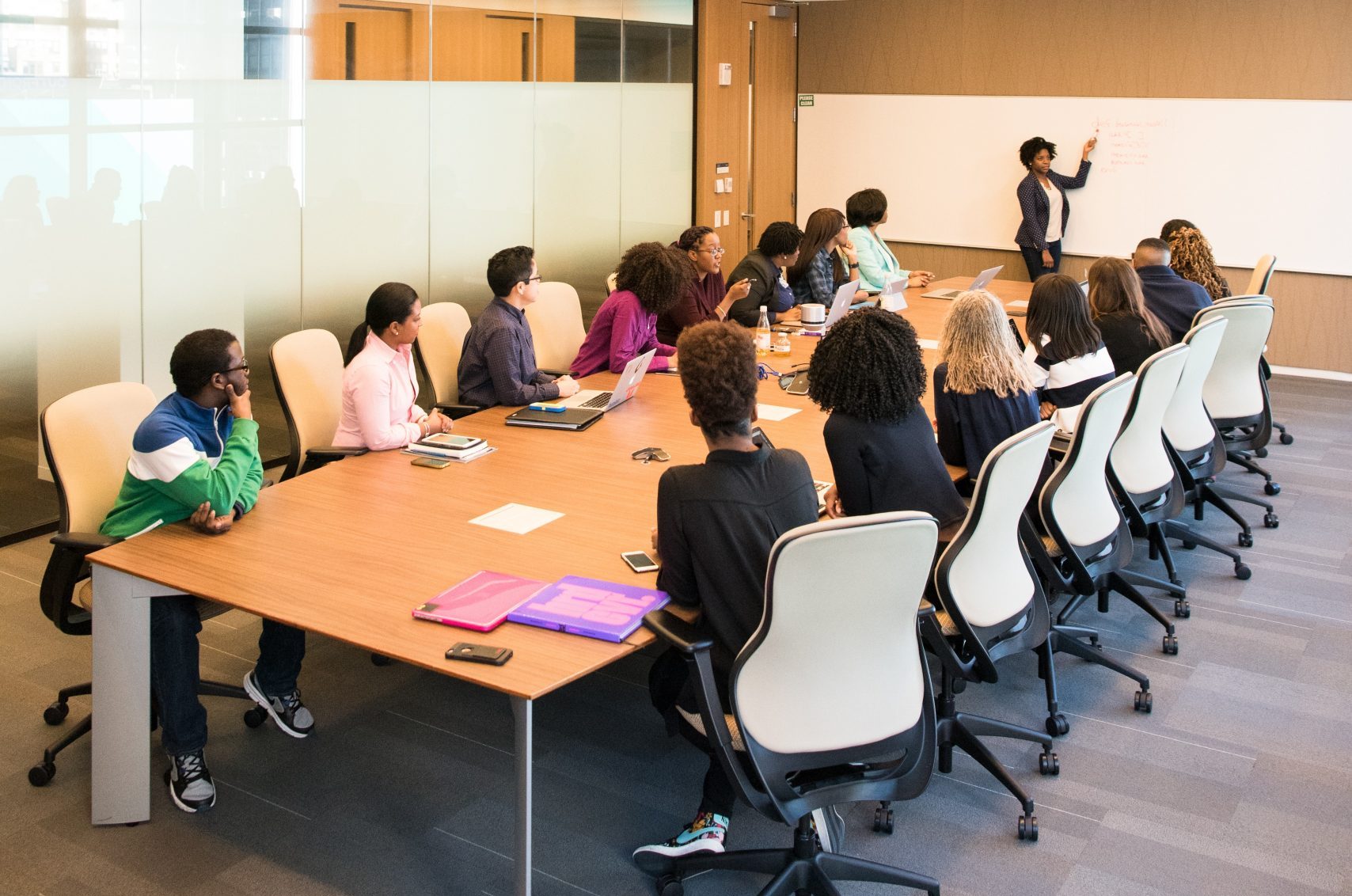TRAIN-THE-TRAINER
Better Trainers = Better Training
PeopleCore provides Train-the-Trainer Workshops to help trainers optimize return on investment

Principles of Instruction
In this course, participants will learn the essential knowledge and skills each trainer should possess. They will learn the objective of training, learning theory, training styles and methods, and presentation and delivery skills. They will also learn how to evaluate learning to ensure the training has met its objective.
☑ Define the objective of training and the principles of adult learning.
☑ Stimulate trainee motivation.
☑ Apply various training methods and models.
☑ Communicate effectively.
☑ Evaluate training.
Principles of Instruction
-
- Lesson One – Introduction to Training
- Lesson Two – Understanding the Adult Learner
- Lesson Three – Learning Theory
- Lesson Four – Training Styles and Methods
- Lesson Five – Presentation and Delivery
- Lesson Six – Evaluation
Anyone who conducts training in a class setting, one-on-one on-the-job training, virtual training, or coaching an individual to improve performance, understanding the principles of instruction will help trainers ensure their training is effective.

Facilitating Classroom Training
Facilitating classroom training is a rewarding, but challenging experience. Three elements of a successful class are the right facility, motivated learners, and a great trainer. In this course, participants will learn how to bring these elements together to ensure they optimize the learning experience in the classroom.
☑ Effectively prepare to conduct a class.
☑ Select and configure a training facility.
☑ Create a comfortable learning environment and effectively deliver the presentation.
☑ Manage the learning environment.
☑ Evaluate learners using knowledge and performance tests.
Facilitating Classroom Training
-
- Lesson One – Preparing for Class
- Lesson Two – The Learning Environment
- Lesson Three – Developing the Presentation
- Lesson Four – Asking and Responding to Questions
- Lesson Five – Classroom Management
Facilitating classroom training is a rewarding, but challenging experience. Three elements of a successful class are the right facility, motivated learners, and a great trainer. This class is for trainers who are looking to improve training in a class setting.

Conducting Structured On-the-Job Training
In this course, participants will learn the advantages of structured OJT, the structured OJT model and how to develop a Master Training Plan.
☑ Describe the differences between structured and unstructured on-the-job training (OJT).
☑ Describe the advantages of structured OJT.
☑ Create a comfortable learning environment and effectively deliver the presentation.
☑ List and describe the six steps of the Structured OJT Process.
☑ Describe the purpose and components of an employee Master Training Plan.
☑ Deliver OJT.
Conducting Structured On-the-Job Training
-
- Lesson One – Principles of OJT
- Lesson Two – Structured OJT Process
- Lesson Three – Employee Training Plans
Many experts believe that 80 – 90 percent of what an employee learns about the job is taught through on-the-job training (OJT), yet the majority of OJT is neither efficient nor effective. Efficient OJT is training that takes the least amount of time and uses the least amount of resources. Effective OJT is training that increases the employee’s skills to the desired level. For OJT to be effective and efficient, the OJT must be structured and the employee must have a Master Training Plan. This course is for all instructors, managers, and supervisors who want to improve their OJT process.

Developing Training Materials
In this module, participants will learn the principles of competency-based training and Instructional System Design. They will also learn the five steps of material development and how to correctly design training manuals and instructor guides.
☑ Describe the elements of competency-based training and Instructional System Design.
☑ Complete the five steps in the material development process.
☑ Create manuals that contain the right content, are visually appealing, and grammatically correct.
☑ Develop instructor guides.
Developing Training Materials
-
- Lesson One – Principles of Course Design
- Lesson Two – Material Development
- Lesson three – Content and Visual Appeal
- Lesson four – Learner Evaluation
- Lesson five – Instructional Materials
- Lesson six – Writing it Right!
Training materials that contain the right content, are focused on the intended audience, and support training objectives and job competencies are an essential training component. They are a valuable resource for the learners during training and a reference after the training. Effective training materials are well-written, correctly structured, and visually appealing. Learning and development professionals, and anyone involved with developing training material will benefit from this course.

Delivering Engaging Virtual Training
In this class, participants will learn how to provide a classroom-quality experience in a virtual learning environment. They will learn how to engage the participants and create experiential learning activities that can be equally effective as classroom learning experiences.
☑ Explain the advantages and disadvantages of virtual training.
☑ Deliver engaging virtual training that simulates classroom instruction.
☑ Select the right virtual platform.
Delivering Engaging Virtual Training
-
- Lesson One – Virtual Training vs. Classroom Training
- Lesson Two – Engaging Participants and Enhancing Learning
- Lesson Three – Choosing the Right Virtual Platform
Virtual training provides an excellent option for delivering training when costs or availability prevent the participants from meeting in a classroom. It can be a challenge to recreate the quality of classroom instruction through a virtual platform, but it is possible. If you want to improve your virtual training, this class is for you.

Master Trainer certification program
Trainers within your organization influence nearly every aspect of how you do business. Do your trainers possess the skills and insight needed to make your training initiatives a success?
Have you ever been a participant in a training session and felt your learning was strained? Perhaps it seemed the trainer didn’t understand your needs or the trainer’s teaching style didn’t fit the way you prefer to learn.
PeopleCore’s Master Train-The-Trainer certification program provides trainers with the mindset, skillset, and toolset to plan, manage, develop and deliver effective employee training.
Our Master Trainer Certification Program prepares trainers in every aspect of the training process. Participants will engage in discussions and interactive activities in order to understand and then master the core competencies and skills required for training excellence. Our approach takes participants through all phases of training delivery from preparation, to presentation, communication, facilitation, and evaluation. Are you ready to improve the quality of training within your organization? Our Master Trainer workshop is here to make that goal a reality.
This 5-Day Workshop Includes:
- Principles of Instruction
- Adult Learning Theory
- DiSC Personal Profile System®
- Conducting On-The-Job Training
- Facilitating Classroom Training
- Developing Training Materials
- Delivering Engaging Virtual Training
Those who complete the Master Trainer Certification will be able to:
- Apply the principles of adult learning
- Conduct engaging classroom training and optimize learning
- Manage and conduct structured on-the-job training
- Deliver engaging virtual training
- Design courses and develop effective training materials
By completing the Master Trainer Certification process, trainers are able to demonstrate they possess the highest levels of training competency. Certification is only awarded to those who have truly mastered the training process. During the certification process, applicants will receive individualized coaching and feedback from our training staff.
Master Trainers are also able to conduct PeopleCore’s Master Trainer Series workshops within their own organizations if a site license has been purchased. This can provide additional flexibility in delivery as well as a potential for significant cost savings.
We know a trainer needs to do more than sit through a class to ensure the highest level of competence.
To receive a certification from PeopleCore, candidates must attend the Master Trainer 5-day workshop or each of the three 2-day Master Trainer Series workshops. After attending the requisite workshops Master Trainer candidates must complete an intensive evaluation process. This unique process allows our trainers to verify trainers are applying the principles from the workshop to their work.
- Attend the 5-day Master Trainer Workshop
- Conduct a classroom training session
- Complete a written evaluation
- Develop and submit a module of instruction for evaluation
- Complete a classroom training practical evaluation
- Complete an OJT practical evaluation
Principles of
Instruction
Facilitating Classroom Training
(OJT) On-The-Job-Training
Developing Training Materials
Delivering Engaging Virtual Training

How important is training?
Better trainers equal better training. Period. A course may include ideal courseware, the perfect venue, and enthusiastic learners and fail if the trainer is ineffective. Conversely, a course that includes below average courseware, a less-than-ideal venue, and lukewarm learners can be extraordinarily successful if the trainer is extraordinary.
Extraordinary trainers go beyond developing employees’ knowledge and skills; they increase employee buy-in, motivation and ownership. They do more than score well on class participant feedback forms; they ensure the participants retain what they learned, apply the learning on-the-job, and impact the success of the organization.
Extraordinary trainers aren’t born, they’re made. Training is a skill just like any other and must be learned, practiced, and perfected. The best trainers are those who have been trained and coached by extraordinary trainers.
PeopleCore’s trainers have conducted hundreds of courses and trained thousands of learners. Through their experience, they have polished presentation skills and are well-equipped to help good trainers become great trainers.







